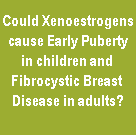![]()
Gold Standard Federally Funded WHI Study Finds that Synthetic Estrogen and Progestins Increase Advanced and Aggressive Breast Cancer
October 19, 2010 By JENNIFER CORBETT DOOREN - Wall Street Journal
Women who contracted breast cancer after using combination hormone-replacement therapy were diagnosed at a more-advanced stage of the disease than women who didn't take hormones, according to new findings from the landmark Women's Health Initiative study.
The federally funded study, known as WHI, was halted in 2002 when data suggested women taking a combination of estrogen and progestin to treat symptoms of menopause had a higher risk of breast cancer than women who received a placebo instead of hormones. Although participants stopped taking hormones at that time, researchers have continued to monitor them to analyze outcomes.
Higher Mortality
Another new finding: Women who used hormone therapy have had a slightly higher mortality rate from breast cancer than women not taking hormones. The findings are published in this week's Journal of the American Medical Association.
Since the initial findings from WHI were released in 2002, women have been advised to use the lowest dose of hormones for the shortest time to relieve hot flashes and other menopausal symptoms. Most doctors say that advice should remain unchanged in light of the latest findings.
The combination of hormones is sold as Prempro by Pfizer Inc., which acquired the product when it purchased Wyeth Pharmaceuticals last year.
Judi Chervenak, an associate clinical professor of obstetrics-gynecology and women's health at Montefiore Medical Center in New York, said she always discusses the risk of breast cancer with patients when helping them decide if they should go on hormone therapy. But Dr. Chervenak said that the average age of women in WHI was 63, about a decade older than women who are entering menopause, so the findings may not be directly applicable to younger women.
Dr. Chervenak said she also advises women first to see if lifestyle changes such as limiting caffeine, exercising and reducing stress through deep-breathing or yoga can help them with the transition to menopause.
Rowan Chlebowski, of the Los Angeles Biomedical Research Institute at Harbor-UCLA Medical Center, is leading the follow-up WHI studies looking at cancer risks.
For the current breast-cancer analysis, Dr. Chlebowski and colleagues looked at 12,788 women involved in the WHI study to compare breast-cancer rates. Women in the original study had been on hormone therapy for an average of 5.6 years and were compared with women not taking hormones. In the follow-up study, the women have been followed for an average of 11 years.
Researchers found that 385 women receiving hormones, or 0.42% per year, developed invasive breast cancer. That compared with 293 women in the placebo group, or 0.34% per year.
Also, 81 of the women in the hormone-therapy group, or 24% of the total, were diagnosed after their cancer spread to lymph nodes. That compared with 43 women, or 16%, diagnosed at that stage in the placebo group. The researchers said that hormones can fuel blood-vessel growth, which in turn can cause tumors to grow faster.
Twenty five women in the hormone group died from breast cancer. That compared with 12 deaths in the placebo group.
Risks vs. Benefits
In an interview, Dr. Chlebowski said the breast-cancer findings—along with another WHI follow-up study released last year that showed an increase in lung-cancer deaths among women taking hormones—should cause women and doctors to weigh the risks and benefits of hormones more carefully.
"You can't define a safe interval [of use]," Dr. Chlebowski said.
In a statement, Pfizer noted that Prempro's label has had a discussion of an increased breast-cancer risk since 1995.
"This analysis does not alter that risk, nor does it dispute hormone therapy's effectiveness," the company said.
Sales of Prempro and its estrogen-only counterpart, Premarin, were $213 million last year, down significantly from about $2 billion annually before the WHI study was halted.
WHI and follow-up studies are being funded by the National Institutes of Health. Dr. Chlebowski reported receiving grants or other fees from Pfizer and other drug companies.


